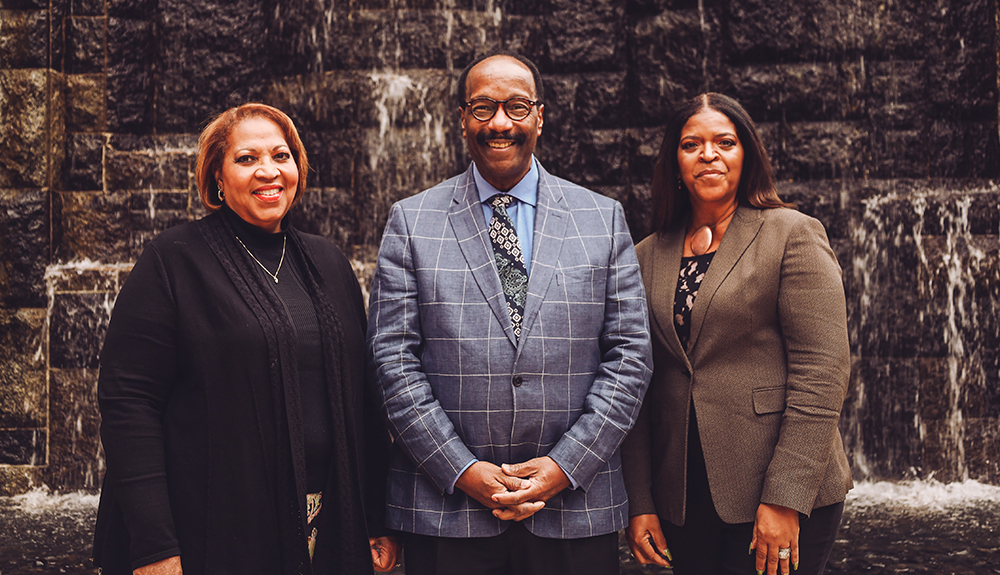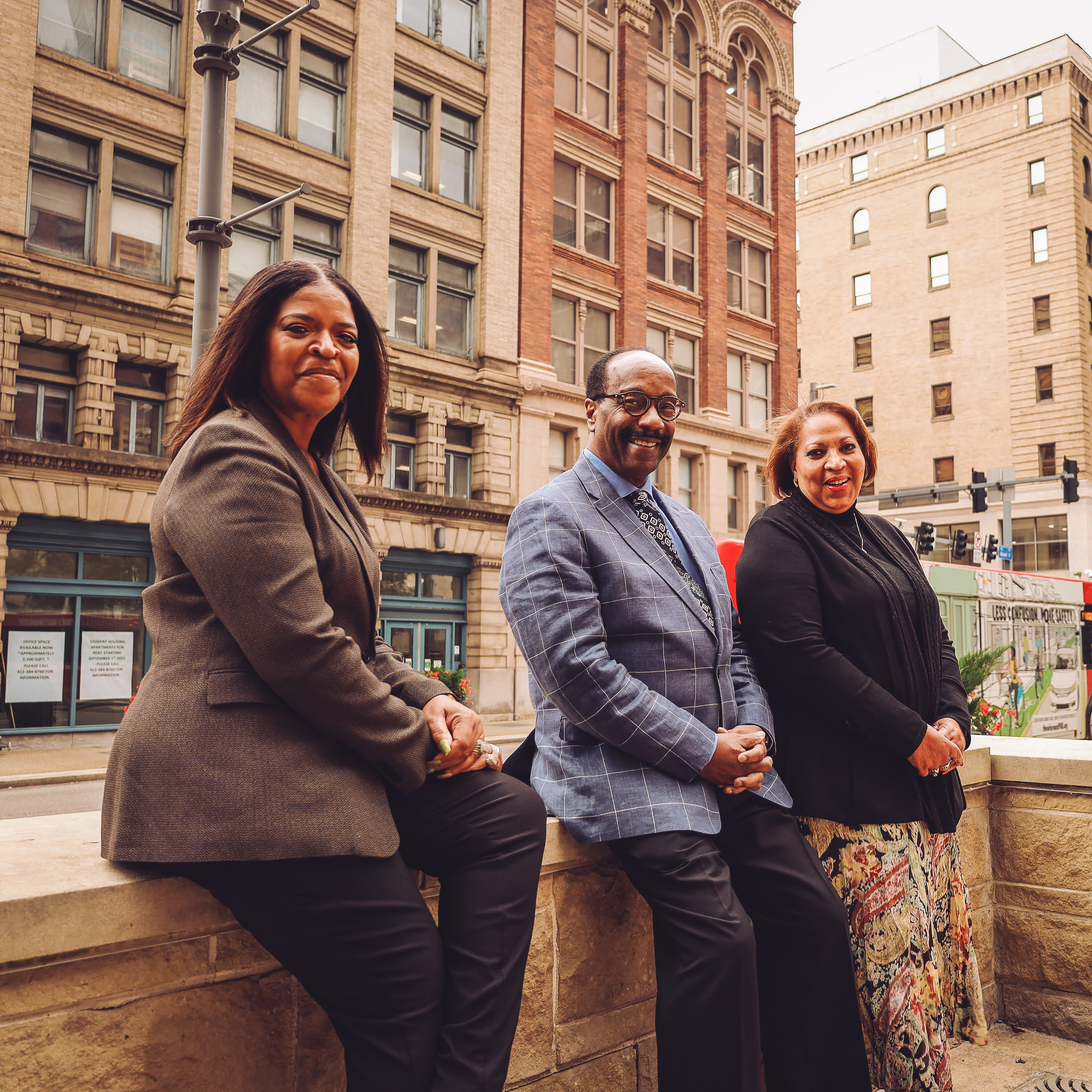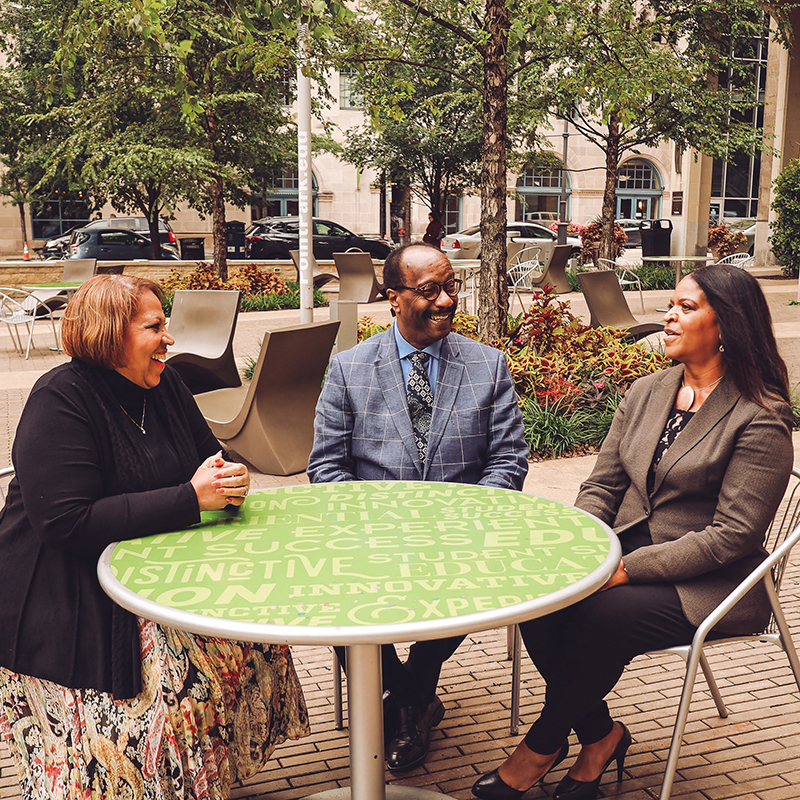Sisters Complete Doctoral Degrees Together at Point Park University Monday, October 4, 2021

"Both had a strong desire to learn, willingness to work hard, listened attentively and explored topics that add meaning after the doctoral dissertation defense. I found that both Karen and Deborah desired to enrich the lives of leadership professionals from nonprofit and for-profit sectors. They are people-centered in their approaches."
What you do know fills a book, and what you don't know fills a library. It's a sentiment that Point Park University alumni Deborah Skillings-Phillips and Karen Smoot often heard from their father.
The sisters recently completed what they call the starting pages of their books for the family legacy. Skillings-Phillips earned a Ph.D. in Community Engagement after defending her dissertation, “The Career Paths and Preparedness to Leadership: Journey to the Top Executive Position of a Small Nonprofit Organization." Smoot earned an Ed.D. in Leadership and Administration with her dissertation, “A Qualitative Phenomenological Study: An Analysis of the Four Tiered Management Levels Based on Factors That Impede Women’s Mobility Through Career Development Stages to Executive Level Positions.”
"It brings joy to my heart because our parents were advocates for education," Smoot said. "We have a generation of females in our family who each have at least a master's degree or above and specialty degrees now. Both of our parents have passed, so to go through these programs, I felt like we were continuing to establish a legacy. Our mother started her doctorate, but because of busy life and family, she was never able to finish. The two of us going through this together set in place another form of legacy for our family. It is important we keep focused and grounded on where it all started."
Skillings-Phillips is the community outreach manager for the Port Authority of Allegheny County. Smoot has more than 30 years of experience working in higher education and state and federal government management leadership positions and took a short sabbatical to complete the doctoral program.
A common denominator for the sisters' success is Mitchel Nickols, Ph.D., a part-time education, business and community engagement instructor at Point Park who served on both of their dissertation committees. He lauded the sisters for being the first African-American siblings to complete doctoral programs together at Point Park. 
"Both had a strong desire to learn, willingness to work hard, listened attentively and explored topics that add meaning after the doctoral dissertation defense," Nickols said. "I found that both Karen and Deborah desired to enrich the lives of leadership professionals from nonprofit and for-profit sectors. They are people-centered in their approaches."
In the Q&A below, learn more about the sisters' journey.
What were the benefits of having your sister to lean on throughout your studies?
DSP: When I was saying no to family events, I had someone in my corner to say, "That's right, she's at home writing." That was a huge advantage of having someone in a program who understood why I wasn't able to attend family functions.
When we were going through different classes, she had a lot more symposiums than I did. Talking through her leadership seminars, I was picking up knowledge and information from her. There was one time I actually sat in on one of her seminars about the most common errors people make in writing their dissertations. There were cross-sections of knowledge we shared.
When we were writing our dissertations at the same time, that was the most important part of having my sister in the program for support. You share differently with your colleagues because you want to act mature and professional, but with your sister, you can get real.
KS: Debbie was inspirational in getting me started and pushing me forward. When you have siblings, you can cry on each other's shoulders. We were a resource for each other. Spiritually, we had to pray all the time. Debbie would send scriptures. We supported each other that way. To be able to connect at the end of the journey was awesome because we needed each other. When you get to this level of education, no one is there to babysit you. We kept each other accountable. Sometimes your spouse may not understand the real lengths and challenges you're going through. They support you, but they don't know what you're going through, so we really needed each other to get through it.
How did our faculty impact you?
DSP: My very first class with Dr. Nickols, our mother had fell and hit her head, and she eventually passed away. I didn't tell anybody until my last class what I was going through. I was trying to be mature and professional in class. The knowledge and wisdom Dr. Nickols placed in me that first class was very impressionable, and it left such an impact on me that when it was time to find my committee, I sought him out because I felt like he got it. Sitting down and talking to him afterwards, I could see how he could play a part in my journey. I just connected with him. He was a strong force in my life without knowing it during that time of our lives when we were taking care of my mom.
Sera Mathew, Ph.D., worked with me individually. The first paper I submitted had so much of her writing on there, I was like, "Where's my paper?" We went through section by section, and she really took the time and built upon what I was supposed to do. She was always my greatest cheerleader.
Patrick Mulvihill, D.Ed., my dissertation chair, guided me. Dr. Mulvihill can zoom in on what needs to be done and where you need to go. He's very patient, and he doesn't micromanage, but if you ever call him, he's there for you.
KS: I enjoyed the opportunity to get to know all the faculty in the program. They all had a plethora of knowledge to share with Cohort X. I also want to share my congratulatory sentiments to my committee – Arleen Wheat, Ed.D., Helena Knörr, Ph.D., and Dr. Nickols, who all had a significant part in offering substantive comments for me to get me through the process and the journey. Dr. Wheat, my dissertation chair, interviewed me for admissions into the Ed.D program and led me through the doors to completion. I will remember our time together from beginning to end. Dr. Knörr was my content specialist and very enthusiastic and supportive throughout the process.
When I was at a standstill in putting together my committee, Debbie called Dr. Nickols. He helped me get my committee together. He assisted me and progressively moved me through, helped me meet the deadlines and the process was much smoother because of that connection. He also strategically clarified the content and planning for the deadlines for me.

Vincenne Revilla Beltrán, Ph.D., is awesome. When you talk about the people you want to surround yourself with and keep as your mentors, advisors and life coaches, she is one of those people. She also taught my favorite course, EDU 712 Cultural and Ethical Diversity. She thinks outside the box and stays relevant with current events and ideas pertinent to the class materials. I am pleased that the School of Education incorporated the course. The overall understandings of the lectures allowed my colleagues and me to gain a new perspective; the experience and knowledge she gave us serve as a foundation in determining what changes we make in our work environments.
I serve on the University's strategic committee for DEI. We need to see those solid African-American mentors like Dr. Nickols. I told him he is now going to be my life coach. It's helpful to see those faces of color on our campus. Our new president is very supportive of diversity, equity and inclusion, and the University is making progressive changes.
Why would you recommend Point Park?
DSP: I like Point Park because of the classroom sizes, the curriculum offered and the resources that are provided.
KS: I liked Point Park because it was convenient. They were very flexible as far as choices between the classroom and online instruction. I think the University is up-and-coming as far as guidance with getting new students in and incorporating student ideas and building off of students, the foundation of the University. They’re willing to make changes based on student recommendations. Again, I go back to DEI. They're progressive with that. I just loved the small classrooms and relationships. I've been to three colleges, and I've never walked away with friendships and relationships with my professors like I have at Point Park.

